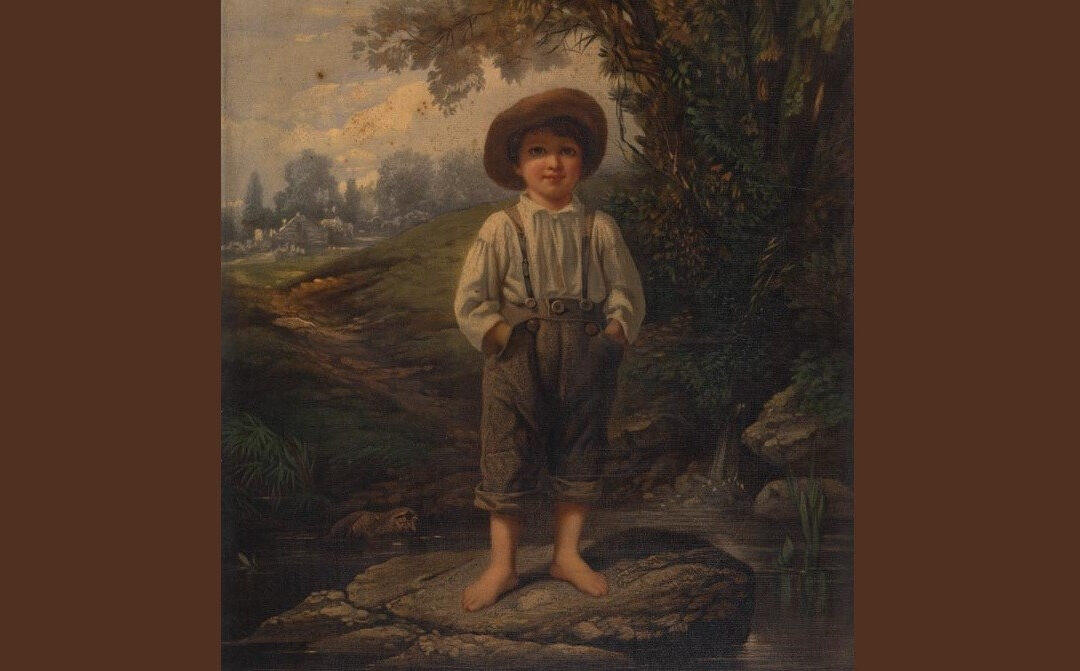Guest Post by Dolly Myers
Per our well established classroom routine, today my kindergartners filed into the classroom after our outdoor recess, grabbed their snack boxes, and found a seat. One of the girls offered a sung blessing on our food and we settled into a calm time of mid-morning refreshment.
One of the boys pulled out a box of fresh strawberries, washed and neatly hulled by mom at home, and ready for this boy to enjoy. He bit into the first one and I immediately had a memory, long dormant in my subconscious but clearly a formative memory that (I realized!) had formed so much of my philosophy of education – and informed the academic science program we are enjoying this year in kindergarten.
The memory was of a once-memorized snippet of a poem by John Greenleaf Whittier. Whittier was an American abolitionist poet whose works made their way into American classrooms for decades before they were swept into the dustbin of progressive education. Somewhere around the 1964-65 school year I was first introduced to “The Barefoot Boy.”
As my student bit down on that sweet, ripe strawberry, my dormant grey matter suddenly burst forth with a few of Whittier’s lines:
Blessings on thee, little man,
Barefoot boy, with cheek of tan!
With thy turned-up pantaloons,
And thy merry whistled tunes;
With thy red lip, redder still
Kissed by strawberries on the hill;
That was about all I could drag out of my memory bank and so I had to pull out my cell phone and look up the rest of the work. Whittier’s poem continues,
With the sunshine on thy face,
Through thy torn brim’s jaunty grace;
From my heart I give thee joy,—
I was once a barefoot boy!
Well, I was never a barefoot boy, but I did run shoeless through many summers. This kindergartener enjoying his strawberries was neither barefoot nor wearing a hat (jaunty or otherwise). Nevertheless, I wanted to remember the rest of the poem and so I began spontaneously reading aloud as Whittier goes on to wistfully compare the glorious days of youth to the burdened days of adulthood:
Prince thou art,—the grown-up man
Only is republican.
Let the million-dollared ride!
Barefoot, trudging at his side,
Thou hast more than he can buy
In the reach of ear and eye,—
Outward sunshine, inward joy:
Blessings on thee, barefoot boy!
Oh for boyhood’s painless play,
Sleep that wakes in laughing day,
Health that mocks the doctor’s rules,
Knowledge never learned of schools,
Next Whittier goes on an expansive survey of the type of outdoor nature study we try to encourage on our “Science Exploration Mondays.” We hardly have this much variety to discover” on the Columbia Presbyterian property, but we routinely try to “see what we can see” outdoors:
Of the wild bee’s morning chase,
Of the wild-flower’s time and place,
Flight of fowl and habitude
Of the tenants of the wood;
How the tortoise bears his shell,
How the woodchuck digs his cell,
And the ground-mole sinks his well;
How the robin feeds her young,
How the oriole’s nest is hung;
Where the whitest lilies blow,
Where the freshest berries grow,
Where the ground-nut trails its vine,
Where the wood-grape’s clusters shine;
Of the black wasp’s cunning way,
Mason of his walls of clay,
And the architectural plans
Of gray hornet artisans!
For, eschewing books and tasks,
Nature answers all he asks;
Hand in hand with her he walks,
Face to face with her he talks,
Part and parcel of her joy,—
Blessings on the barefoot boy!
Folks, if that doesn’t encourage you to get your child outdoors to explore the woods, then you and I are clearly doing something wrong! But Whittier is just getting started; he has more encouragement for parents who are not yet convinced of the joyous benefits of playing outside, exploring nature:
Oh for boyhood’s time of June,
Crowding years in one brief moon,
When all things I heard or saw,
Me, their master, waited for.
I was rich in flowers and trees,
Humming-birds and honey-bees;
For my sport the squirrel played,
Plied the snouted mole his spade;
For my taste the blackberry cone
Purpled over hedge and stone;
Laughed the brook for my delight
Through the day and through the night,
Whispering at the garden wall,
Talked with me from fall to fall;
Mine the sand-rimmed pickerel pond,
Mine the walnut slopes beyond,
Mine, on bending orchard trees,
Apples of Hesperides!
Still as my horizon grew,
Larger grew my riches too;
All the world I saw or knew
Seemed a complex Chinese toy,
Fashioned for a barefoot boy!
Next, Whittier seems to imply that robust outdoor experiences can foster and develop healthy and creative imaginations. It’s true!
Oh for festal dainties spread,
Like my bowl of milk and bread;
Pewter spoon and bowl of wood,
On the door-stone, gray and rude!
O’er me, like a regal tent,
Cloudy-ribbed, the sunset bent,
Purple-curtained, fringed with gold,
Looped in many a wind-swung fold;
While for music came the play
Of the pied frogs’ orchestra;
And, to light the noisy choir,
Lit the fly his lamp of fire.
I was monarch: pomp and joy
Waited on the barefoot boy!
Finally, as Whittier gets to the end of his song, he returns us to the realities of adulthood and he expresses a prayer and hope for a childhood full of joy that will prepare the kindergartner for days ahead. I was about to cry, so I put away my phone. I’m not sure whether the emotion came from past days that seem unretrievable, or from the surprisingly favorable response from the children who froze in their tracks to listen attentively to the poetry.
I put the phone away, but I commend the rest of the lines for your enjoyment and encouragement:
Cheerily, then, my little man,
Live and laugh, as boyhood can!
Though the flinty slopes be hard,
Stubble-speared the new-mown sward,
Every morn shall lead thee through
Fresh baptisms of the dew;
Every evening from thy feet
Shall the cool wind kiss the heat:
All too soon these feet must hide
In the prison cells of pride,
Lose the freedom of the sod,
Like a colt’s for work be shod,
Made to tread the mills of toil,
Up and down in ceaseless moil:
Happy if their track be found
Never on forbidden ground;
Happy if they sink not in
Quick and treacherous sands of sin.Ah! that thou couldst know thy joy,
Ere it passes, barefoot boy!
Afterward, Mrs. Richards and I agreed – we need more poetry in kindergarten! I already have Stevenson’s “The Children’s Hour” ready for our read aloud in February, when our theme for the month is love, and I’ll be looking to see what else we can incorporate this year.
And, if you don’t have a good book of childhood poetry to enjoy regularly with your child, I’ve linked a few anthologies below, that “thou could know thy joy!”
The Children’s Book of Virtues
Sunny Rhymes for Happy Children
iF: A Treasury of Poems for Almost Every Possibility
Dolly Myers is the Curriculum Advisor and Kindergarten teacher at Granite Classical Tutorials.


